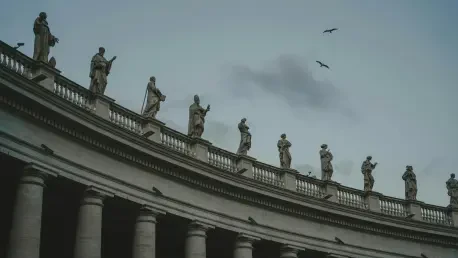Pope Leo XIV has stepped into a legacy fraught with intricate financial challenges, a narrative woven with scandals and fiscal inconsistencies for centuries. His accession marks an era where heightened scrutiny surrounds the Vatican’s complex financial labyrinth, reminiscent of earlier notorious scandals like the Banco Ambrosiano collapse in 1982. Despite abundant income sources, the Vatican experiences chronic deficits. While museums, hospitals, extensive real estate holdings, and generous gifts sustain it, financial health remains elusive. It continues the delicate balancing act following a €70 million loss on €1.2 billion in revenue as reported in recent accounts. The Catholic Church’s finance structures, often criticized for opacity, now demand increased transparency and accountability, a formidable challenge that is now Pope Leo XIV’s to undertake. His predecessor, Pope Francis, initiated several corrective measures aimed at financial rectitude. The pressing question remains: can Pope Leo XIV further these endeavors to bring about fiscal solvency?
Historical Precedents and Recent Developments
Scandals and Financial Transformation
The Vatican’s entanglement with financial scandals is not a modern anomaly but a persistent theme in its history. The notorious collapse of Banco Ambrosiano in 1982 set a precedent of financial turmoil that continues to haunt the Vatican. This incident involved allegations of money laundering that signified a dark chapter in ecclesiastical financial management. Pope Francis’s tenure witnessed the introduction of reforms, a direct response to the persistent financial disorder. A significant milestone in these efforts was the formation of a special economic secretariat in 2014, tasked with scrutinizing financial operations to mitigate corruption. Despite progress, these measures faced challenges with alleged embezzlement by high-profile figures like Cardinal Angelo Becciu becoming public knowledge. The Vatican’s precarious investment decisions, funded by donations intended for papal charities, have fueled public skepticism, illustrating the complexities Pope Leo XIV inherits in his quest to revitalize the Vatican’s financial structures.
Transparency and External Pressures
Years preceding Pope Leo XIV’s papacy were characterized by transformation yet marked by external pressures. These included Italy suspending the Vatican’s bank card payments over insufficient anti-money laundering measures and the United States flagging concerns regarding potential money laundering within the ecclesiastical financial institution. These developments underscored the Vatican’s struggles to align with global financial norms. However, efforts under Pope Francis led to tangible progress when the Council of Europe lauded the Pope’s economic team for increasing financial transparency. Achievements like shutting down 5,000 suspect bank accounts reported progress, but the underlying systemic instabilities endured. Pope Leo XIV’s leadership now becomes crucial to maintaining momentum in the face of enduring challenges. He must navigate a landscape marked by legacy complications, enduring scrutiny, and a delicate balance of maintaining religious principles amid financial reforms. The world watches to see if he can pivot from these pressures into a sustainable fiscal future.
Current Challenges of Pope Leo XIV
Financial State and Internal Challenges
Pope Leo XIV confronts an array of entrenched financial issues that speak to larger systemic inadequacies within Vatican economic frameworks. Among the primary concerns is the sharp decline in donations, a lifeline for Vatican funding, alarming as they historically represented a significant revenue stream. The reductions in donations could reflect global economic conditions or waning fervor among the laity, necessitating strategic reconsiderations. Additionally, escalating personnel costs further strain Vatican finances. As operational expenses rise, driven by the economic demands of an extensive global workforce, restructuring might become inevitable. Furthermore, the Vatican pension system stands on precarious footing. Pope Francis deemed it unsustainable for the long-term security of future retirees in Vatican service. Addressing this will be crucial for fiscal sustainability, demanding Pope Leo XIV’s immediate focus and potential reconsideration of internal economic management practices.
Prospects for Fiscal Reform
As Pope Leo XIV takes the mantle, he is expected to continue emphasizing financial transparency and discipline, aligning with his predecessor’s efforts. Financial stability necessitates innovative solutions, engaging various stakeholders in redefining donation strategies, cost containment initiatives, and robust pension scheme reforms. Establishing a sustainable model requires a reevaluation of existing asset management tactics, urging more responsible fiscal practices and investments that align with ethical and religious doctrine. These endeavors would not only strive to improve financial health but also reinforce credibility with the global Catholic community. Moreover, leveraging technology for transparent accounting could play a pivotal role in future reforms. Such initiatives will likely face resistance but might be essential in crafting a resilient financial foundation. As Pope Leo XIV navigates these robust challenges, his leadership plays a critical role in renavigating one of the world’s oldest institutions into contemporary fiscal effectiveness, balancing tradition with necessary innovation.
Navigating Future Possibilities
Pope Leo XIV has entered a historical narrative brimming with financial complexities, plagued by centuries of scandals and fiscal inconsistencies. His rise to papacy ushers in a time where the Vatican’s financial maze faces intensified scrutiny, reminiscent of the infamous Banco Ambrosiano scandal from 1982. Despite having diverse income streams, such as revenue from museums, hospitals, extensive real estate portfolios, and generous donations, the Vatican battles persistent deficits. Recent reports indicated a significant €70 million loss on €1.2 billion in revenue, underlining the ongoing quintessential balancing act. The Catholic Church, often criticized for financial opacity, faces mounting demands for increased transparency and accountability, presenting a formidable challenge for Pope Leo XIV. Pope Francis, his predecessor, embarked on several corrective measures toward financial integrity. The urgent question now is: can Pope Leo XIV advance these efforts to achieve financial stability for the Vatican?









